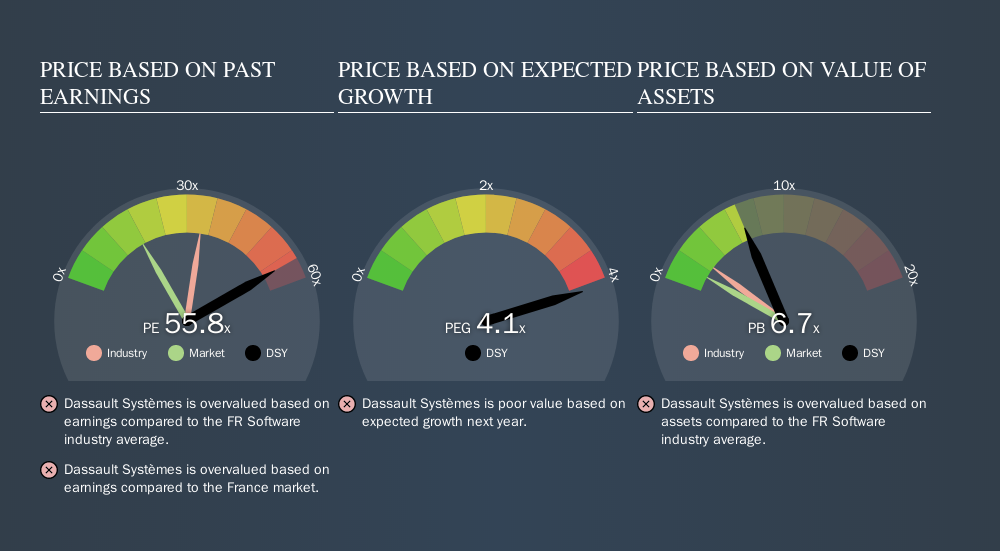Despite Its High P/E Ratio, Is Dassault Systèmes SE (EPA:DSY) Still Undervalued?
This article is written for those who want to get better at using price to earnings ratios (P/E ratios). We'll show how you can use Dassault Systèmes SE's (EPA:DSY) P/E ratio to inform your assessment of the investment opportunity. What is Dassault Systèmes's P/E ratio? Well, based on the last twelve months it is 55.78. In other words, at today's prices, investors are paying €55.78 for every €1 in prior year profit.
See our latest analysis for Dassault Systèmes
How Do You Calculate Dassault Systèmes's P/E Ratio?
The formula for P/E is:
Price to Earnings Ratio = Price per Share ÷ Earnings per Share (EPS)
Or for Dassault Systèmes:
P/E of 55.78 = €134.15 ÷ €2.40 (Based on the year to September 2019.)
Is A High Price-to-Earnings Ratio Good?
A higher P/E ratio means that investors are paying a higher price for each €1 of company earnings. All else being equal, it's better to pay a low price -- but as Warren Buffett said, 'It's far better to buy a wonderful company at a fair price than a fair company at a wonderful price.
How Does Dassault Systèmes's P/E Ratio Compare To Its Peers?
The P/E ratio essentially measures market expectations of a company. As you can see below, Dassault Systèmes has a higher P/E than the average company (33.6) in the software industry.

That means that the market expects Dassault Systèmes will outperform other companies in its industry.
How Growth Rates Impact P/E Ratios
Generally speaking the rate of earnings growth has a profound impact on a company's P/E multiple. That's because companies that grow earnings per share quickly will rapidly increase the 'E' in the equation. Therefore, even if you pay a high multiple of earnings now, that multiple will become lower in the future. And as that P/E ratio drops, the company will look cheap, unless its share price increases.
Dassault Systèmes saw earnings per share improve by -8.5% last year. And earnings per share have improved by 15% annually, over the last five years. Shareholders have some reason to be optimistic, but the future is always uncertain. So further research is always essential. I often monitor director buying and selling.
A Limitation: P/E Ratios Ignore Debt and Cash In The Bank
One drawback of using a P/E ratio is that it considers market capitalization, but not the balance sheet. That means it doesn't take debt or cash into account. In theory, a company can lower its future P/E ratio by using cash or debt to invest in growth.
Spending on growth might be good or bad a few years later, but the point is that the P/E ratio does not account for the option (or lack thereof).
Is Debt Impacting Dassault Systèmes's P/E?
Dassault Systèmes has net cash of €2.2b. That should lead to a higher P/E than if it did have debt, because its strong balance sheets gives it more options.
The Verdict On Dassault Systèmes's P/E Ratio
With a P/E ratio of 55.8, Dassault Systèmes is expected to grow earnings very strongly in the years to come. EPS was up modestly better over the last twelve months. And the healthy balance sheet means the company can sustain growth while the P/E suggests shareholders think it will.
Investors should be looking to buy stocks that the market is wrong about. People often underestimate remarkable growth -- so investors can make money when fast growth is not fully appreciated. So this free report on the analyst consensus forecasts could help you make a master move on this stock.
Of course, you might find a fantastic investment by looking at a few good candidates. So take a peek at this free list of companies with modest (or no) debt, trading on a P/E below 20.
We aim to bring you long-term focused research analysis driven by fundamental data. Note that our analysis may not factor in the latest price-sensitive company announcements or qualitative material.
If you spot an error that warrants correction, please contact the editor at editorial-team@simplywallst.com. This article by Simply Wall St is general in nature. It does not constitute a recommendation to buy or sell any stock, and does not take account of your objectives, or your financial situation. Simply Wall St has no position in the stocks mentioned. Thank you for reading.
About ENXTPA:DSY
Flawless balance sheet with moderate growth potential.
Similar Companies
Market Insights
Community Narratives





